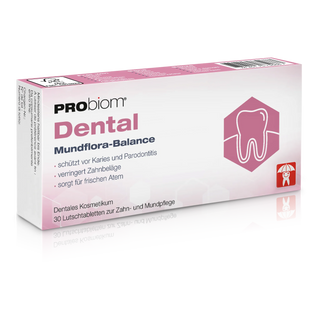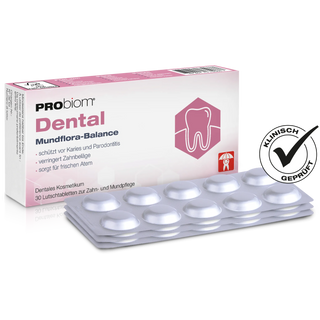Bad breath – or halitosis – is an unpleasant problem for many people, one that can lead to insecurity and social inhibition in everyday life. The cause is often not only poor dental care, but frequently lies on the tongue itself. The surface of the tongue provides an ideal breeding ground for bacteria that produce foul-smelling substances. A tongue scraper is a simple yet extremely effective tool for removing this bacterial coating and thus combating bad breath for the long term. In this article, you'll learn exactly how a tongue scraper works, why it's so important for oral health, and how to use it correctly.
How does bad breath occur?
Bad breath is primarily caused by volatile sulfur compounds (VSCs) produced by certain bacteria in the mouth. These bacteria break down proteins from food debris, cells, and mucus on the surface of the tongue, between teeth, or in the gum pockets. A whitish or yellowish coating often accumulates on the tongue, especially on the tongue—the so-called tongue coating—and serves as a breeding ground for odor-causing bacteria.
The natural bacterial balance in the mouth can be disturbed by various factors:
-
Inadequate oral hygiene
-
Dry mouth (reduced saliva flow)
-
Smoke
-
Certain foods such as garlic or onions
-
Diseases such as gingivitis or caries
-
Medical causes (e.g. diabetes, stomach problems)
Compared to dental care, tongue cleaning is often neglected, even though the majority of odor-causing bacteria are found on the tongue.
The role of the tongue in bad breath
The tongue is a living organ with a rough surface composed of countless tiny papillae. This structure provides a huge surface area where bacteria, dead cells, food debris, and mucus can easily accumulate. Coating occurs primarily in the back of the tongue, where cleaning by saliva flow and natural mouth movements is least effective.
These microorganisms mainly produce sulfur compounds such as:
-
Hydrogen sulfide (raw egg smell)
-
Methyl mercaptan (rotten cabbage smell)
-
Dimethyl sulfide (foul smell)
These gases are extremely odorous and are responsible for unpleasant bad breath.
Why is brushing your teeth alone not enough?
While brushing your teeth is the foundation of oral hygiene, it only cleans the tooth surfaces and removes plaque where the brush can reach. Toothbrushes, on the other hand, don't reach the tongue adequately. The bristles are often too soft or short to thoroughly remove plaque, and the back of the tongue and the sides of the tongue are usually ignored when brushing.
This causes the odor-causing bacteria to remain on the tongue, perpetuating the bad breath problem. Studies show that daily tongue cleaning can significantly reduce the concentration of sulfur compounds.
What is a tongue scraper?
A tongue scraper is a special hygiene instrument, usually made of plastic or metal, designed to efficiently scrape the surface of the tongue without damaging the sensitive mucous membranes. Unlike a toothbrush, it is flat and wide to remove as much plaque as possible in one stroke.
Tongue scrapers are inexpensive, reusable, and easy to use. They come in a variety of sizes and materials. Metal versions are more durable and easy to clean, while plastic ones are often more flexible.
How does a tongue scraper help against bad breath?
By scraping off the tongue coating, the tongue scraper removes:
-
Accumulations of bacteria and their metabolic products
-
Food residues and mucus that serve as a breeding ground
-
Deposits that cannot be reached by saliva cleaning
This drastically reduces the number of bacteria that produce sulfur compounds. Regular tongue cleaning therefore not only improves breath but also the overall feel of your mouth.
A study from the Journal of Periodontology (2017) showed that after just one week of daily tongue cleaning, the concentration of odor-causing sulfur compounds could be reduced by up to 70%.
The optimal time and the correct application
The best time to clean your tongue is first thing in the morning, after you wake up, before eating or drinking anything. Saliva production decreases overnight, which promotes the growth of odor-causing bacteria.
Here's how to proceed:
-
Open your mouth wide and stick out your tongue slightly to reach the back.
-
Place the tongue scraper at the back of the tongue (not too far back to avoid gagging).
-
Gently pull the scraper forward over the tongue to scrape off the coating.
-
Rinse the scraper under running water after each stroke.
-
Repeat the process 3-5 times until the tongue feels clean.
It's important to proceed gently to avoid injury. Avoid pressing the tongue scraper too hard.
Tongue cleaning and general oral hygiene – one unit
Tongue cleaning should be an integral part of your daily oral care routine—in addition to brushing your teeth and using dental floss or interdental brushes. Holistic oral hygiene helps prevent tooth decay, gum disease, and bad breath.
Many people notice that their sense of taste improves significantly due to improved oral hygiene, because plaque on the tongue can also cover taste buds.
Further advantages of the tongue scraper
In addition to reducing bad breath, tongue cleaning has other positive effects:
-
Improvement of the oral microbiota: The removal of disease-promoting bacteria promotes a healthy oral environment.
-
Promotes saliva production: Stimulation of the tongue surface stimulates saliva flow, which supports the self-cleaning of the mouth.
-
Support for gingivitis: Fewer bacteria also mean less inflammation.
-
Increase general well-being through fresh breath.
When should you see a doctor or dentist?
If bad breath persists despite regular tongue cleaning and good oral hygiene, this may indicate other causes, such as:
-
Tooth or gum disease
-
Inflammation of the tonsils or sinuses
-
Diseases of the digestive tract
-
Systemic diseases such as diabetes or liver disease
In such cases, specialist medical examination is important.
Myths and misconceptions about tongue cleaning
Many people believe that tongue coating is made up solely of food debris or that brushing their teeth is sufficient to clean the tongue. In fact, the coating is primarily bacterial, and a toothbrush is not ideal for tongue cleaning.
Another myth is that tongue scrapers can cause injuries. When used correctly, the risk is very low; injuries are usually the result of excessive pressure or improper technique.
Conclusion
Bad breath is often a symptom of an imbalanced oral flora, the main source of which is bacterial plaque on the tongue. Daily use of a tongue scraper effectively removes bacteria and their odorous compounds, thus promoting fresher breathing. Combined with thorough tooth brushing and other oral hygiene practices, the tongue scraper is a simple, inexpensive, and effective tool for combating bad breath.
If you've been neglecting tongue cleaning, it's worth incorporating this little ritual into your daily routine. Your friends and your self-confidence will thank you.













